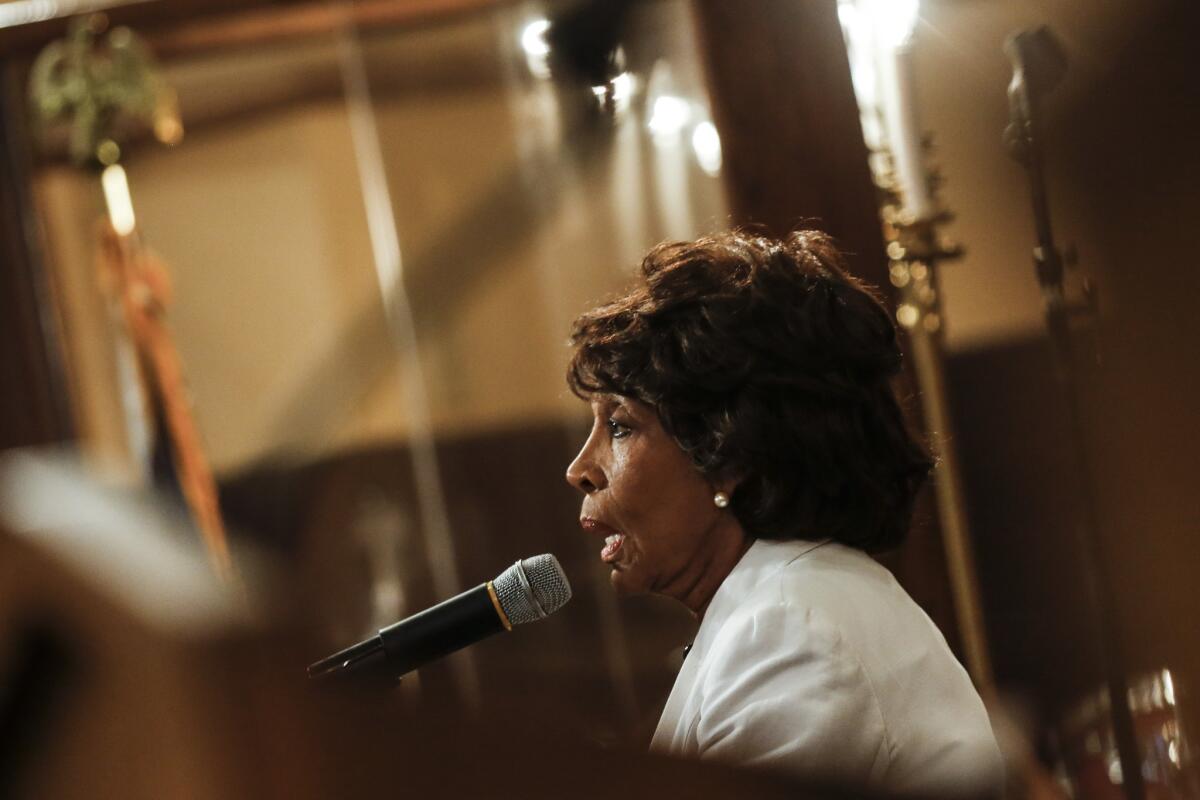Bipartisan bill to reauthorize Export-Import Bank unveiled

Two federal lawmakers from California unveiled bipartisan legislation Tuesday to reauthorize the embattled Export-Import Bank for five years, proposing changes to its operations in hopes of addressing concerns of conservative critics.
Among the reforms are an enhanced reserve fund to cover losses on loans the bank makes to foreign buyers of U.S. goods, as well as codifying the position of chief risk officer, which the bank added last year.
Rep. Maxine Waters (D-Los Angeles) teamed with Rep. Gary Miller (R-Rancho Cucamonga) on the legislation, which comes after a short-term extension of the bank’s charter was included last month in a bill to temporarily fund the government.
The charter was reauthorized until June 30, much less than the five years the Obama administration and bank supporters had sought.
Strong conservative opposition put the bank in danger of shutting down when its charter expired on Sept. 30. So the nine-month extension was a victory for business groups, which lobbied hard to save the agency and the funding it provides to help U.S. companies sell their goods abroad.
The extension gives supporters time to address criticisms that the bank’s aid amounts to “crony capitalism” that mostly helps large companies such as Boeing Co. and puts taxpayers at risk for losses on $140 billion in outstanding assistance.
The bank, however, has not incurred any losses in recent years and does not receive any federal funding, though it turns its profits over to the government. It pays for its operations through interest and fees on loans and other assistance. Last year, it provided $27.7 billion in export assistance and sent a record earnings of $1.1 billion to the Treasury.
“The Export-Import Bank’s support of U.S. businesses is an example of how our government can facilitate job growth without adding to the national debt,” said Miller, a strong supporter of the agency.
“Congress must give American businesses the certainty they need to compete in the global markets by passing a multi-year reauthorization of the Export-Import Bank,” he said.
Waters and Miller are senior members of the House Financial Services Committee, which oversees the bank. Miller is the committee’s vice chairman and Waters is its top-ranking Democrat.
But Miller is not running for reelection, and his term expires in early January. It’s unlikely Congress will take up the legislation during a short, end-of-the year session after the November elections.
Also, the biggest opponent of the bank is the committee’s chairman, Jeb Hensarling (R-Texas), who didn’t offer much hope for the bill.
“I look forward to the bank’s expiration and working with members to make our exporters more competitive by advancing pro-growth tax, energy, regulatory and liability policies,” he said Tuesday.
Waters described the bill as “a balanced compromise” developed after months of talks with small businesses and other stakeholders.
“This legislation contains a responsible set of reforms that we believe will strengthen the Export-Import Bank and lay the groundwork for a bipartisan agreement that extends the bank’s charter over the long term,” she said .
Some Republicans and most Democrats support the bank.
A key provision of the bill from Waters and Miller would require the bank to build an enhanced reserve fund to ease worries that taxpayers would have to pay for future losses.
The bank would have to set aside half of its annual profits until the fund contained enough to cover 5% of its outstanding assistance or 95% of the losses that would occur in a worst-case-scenario stress test.
In requiring the bank to have a chief risk officer, the bill lays out specific responsibilities.
The legislation also would require a pilot program in which private banks would share up to $1 billion in risk for the agency’s long-term loan guarantees in exchange for receiving some of the fees paid for those guarantees.
The provision is aimed at encouraging private banks to play a greater role in export assistance.
For breaking economic news, follow @JimPuzzanghera on Twitter







